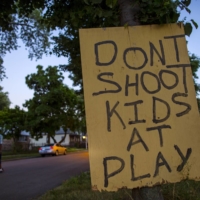New York – The high number of mass shootings in the United States show that the National Rifle Association (NRA) and other lobbying groups have been extraordinarily successful in influencing lawmakers. Although a large number of Americans say that gun laws should be more restrictive — a necessary step to control this “epidemic” — Congress continues refusing to pass effective gun control laws.
The reluctance by lawmakers — mostly Republican — to pass more restrictive gun laws makes one wonder if they have children or grandchildren. How then can it be explained that they are deaf to a problem that has cost thousands of lives and injured many more? Why are they unable to do their job to stop a phenomenon that is a curse to society? Why do they allow their own children to live in such a brutal culture?
Through the first five months of 2021 in the United States, guns have been involved in 8,000 deaths, according to the Gun Violence Archive, a nonprofit research organization. The number of casualties exceeds those of the first five months of 2020, which had been the deadliest year for gun violence in the last two decades.
In the meantime, gun sales are soaring. In 2020, more than 23 million guns were sold, a 66% increase over 2019-gun sales, according to federal data. Statistics show that the U.S. has the most guns per capita and the weakest gun control laws of any developed country. It is estimated that at least a third of American adults own a gun, and an additional 11% live with someone who does.
Gun violence, however, should be seen in the wider context of a culture of violence, which is not just the result of gun ownership. Violence is a multicausal phenomenon that requires a collaboration of individuals and institutions to address. Violence is a political and legal problem, with lawmakers needing to pass appropriate laws; a public health issue, with firearms exacerbating such problems; an educational issue, with educating our youth to the dangers being of the utmost importance; and a social concern as it disrupts the fabric of society, especially impacting less privileged communities.
Self-defense has often been cited to justify the people’s right to bear arms. Some research, however, has shown that a gun kept in a home is much more likely to be involved in the death of a member of the household or a friend rather than an intruder.
According to the U.S. Centers for Disease Control and Prevention, there were 39,707 firearm-related deaths in 2019 in the U.S., and firearm-related injuries were among the five leading causes of death for people ages 1-64 in the country. In addition, the economic impact of gun violence is substantial. It costs the government $280 billion annually on medical care and lost productivity.
Although many Americans claim that guns are necessary for security, experiences in countries such as Japan prove the fallacy of this argument. In Japan, people who purchase guns have strict background checks. These checks include a mental health assessment performed at a hospital, checking for evidence of drug use and the questioning of relatives and colleagues about the applicant. As a result, there are less than 100 gun-related fatalities annually in a country with a population of nearly 126 million people.
Americans are exposed to violence from childhood. It is estimated that by the time a child becomes an adult, he will have seen 16,000 killings and 200,000 acts of violence on television or in the movies. Should we be surprised when children try to imitate what they see on television and in the movies? For some of them, violence has become the norm for solving conflicts.
Gun violence can be prevented by applying public health strategies such as the continued surveillance of gun-related death and injuries; identification of risk factors; development and evaluation of interventions to reduce those factors; and the institutionalization of successful prevention strategies.
In addition, it will require a concerted effort by all members of the community, including law enforcement, public officials, teachers, school administrators, experts in psychology and religious leaders.
As gun sales soar in the country, until violence is addressed as a multifaceted problem requiring multifaceted solutions, it will continue to threaten not only people’s lives but the nation’s future as a civilized society.
Cesar Chelala, an international public health consultant and the author of “Violence in the Americas,” a publication of the Pan American Health Organization.
In a time of both misinformation and too much information, quality journalism is more crucial than ever.
By subscribing, you can help us get the story right.
SUBSCRIBE NOW



